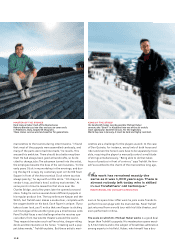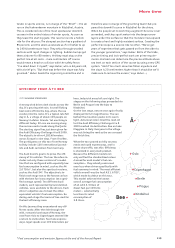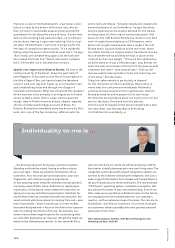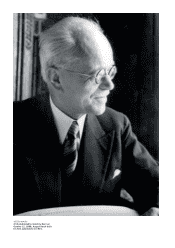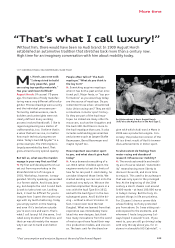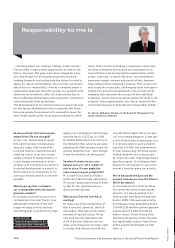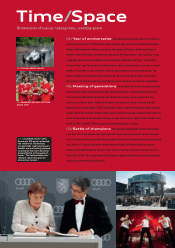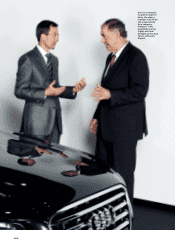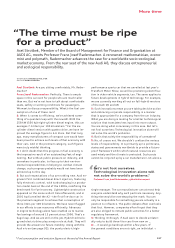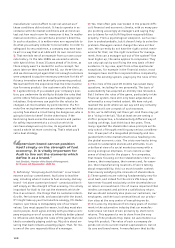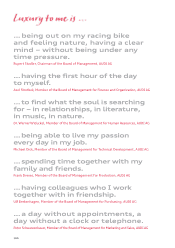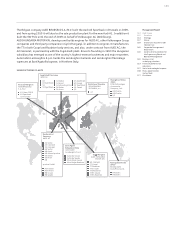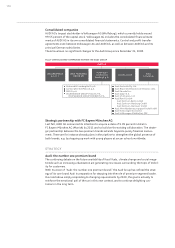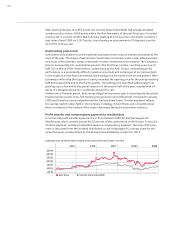Audi 2009 Annual Report Download - page 131
Download and view the complete annual report
Please find page 131 of the 2009 Audi annual report below. You can navigate through the pages in the report by either clicking on the pages listed below, or by using the keyword search tool below to find specific information within the annual report.manufacturer cannot afford to opt out and act as if
those conditions did not exist. It has to operate in ac-
cordance with the market conditions and at most can
test out how much room for maneuver it has. In mathe-
matical economics, we call that a prisoner’s dilemma.
In such a situation, it is neither wise nor responsible to
do what you actually consider to be sensible. In order to
safeguard its very existence, a company may even have
to act in a way that is at odds with its own convictions.
S: That reminds me of an example from our own corpo-
rate history. In the late 1980s we unveiled a vehicle
with hybrid drive. It was 15 years ahead of its time, as
there simply wasn’t a market for such a concept. Ten
years later we then launched the A2, our three-liter car.
And we discovered yet again that not enough customers
were prepared to pay the necessary premium for this ef-
ficiency innovation and technically pioneering product.
We learned from the experience that the time must be
ripe for every product – the customer calls the shots.
R: I agree entirely. If you weaken your company’s posi-
tion, you undermine its ability to dictate the rules that
all the others follow and to spearhead the appropriate
initiatives. Only winners can push for the rules to be
changed. Let me illustrate my point like this: If a For-
mula One racing team whose cars always come last kicks
up a big fuss about a circuit being too dangerous, who is
going to listen to them? On the other hand, if the
best racing team voices the same concerns and pushes
for safety improvements to a circuit on which its
cars have always won up to now, its arguments will
sound a whole lot more convincing. That’s what you’d
call a dual strategy.
S: Definitely! “Vorsprung durch Technik” is our brand
essence and our commitment. Audi aims to lead the
way, including when it comes to fuel economy. But any
brand – let alone a premium brand – cannot position it-
self simply on the strength of fuel economy. It is vitally
important for Audi to live out the elements which de-
fine it as a brand – the things that its customers identi-
fy with, feel at ease with, and associate with the brand.
If I might take up your Formula One analogy, Mr. Rader-
macher, sportiness is indisputably one of our brand
values. Cars must appeal to reason, but they must also
excite people. And I agree entirely with you that a com-
pany enjoying a run of success is infinitely better placed
to influence and change the rules of the game than one
that is constantly playing catch-up. My job is about en-
suring that Audi remains a leading player. That, for me,
is one of the core responsibilities of a manager.
R: Yes, that often gets overlooked in the present diffi-
cult financial and economic climate, with so many peo-
ple pointing accusingly at managers and saying they
are to blame for not fulfilling their responsibilities
properly. From a psychological viewpoint, such a reac-
tion is understandable, but it doesn’t help to solve the
problem. Managers cannot change the rules on their
own. We currently do not have the right control mech-
anisms for that, nor the right incentives for manage-
ment. How can a manager opt out of the system? One
level higher up, the same applies to companies: They
can only opt out by sacrificing the very basis of their
existence. In my view, apart from a few spectacular
exceptions, for example in the financial sector, most
managers have met their responsibilities competently
within the existing system, playing by the rules of the
game.
S: The crisis of the past 18 months has raised many
questions, including for me personally. The topic of
sustainability has acquired an entirely new relevance.
But I believe the rules of the game, particularly in the
financial system, have still only been adjusted and
reformed to a very limited extent. We have not yet
reached the point where we can say with any certainty
that we won’t see a repeat of such excesses.
R: No, we’re definitely not there yet. And there may yet
be a “sting in the tail.” But at least we are seeing a
shift in perspective, a fundamentally different way of
looking at things. Just think back ten years. Then,
many regarded the shareholder value principle as the
only school of thought meriting any serious considera-
tion. It was part of a misguided philosophy and mis-
guided faith in the markets that led us headlong into
the global economic crisis. The crisis now has to bring
us back to sustainable stances and attitudes, to an
ordoliberal view of a social market economy with a
strong ecological emphasis. It can restore a clear
sense of direction for the players. For companies,
that means focusing on their stakeholders: their cus-
tomers, their employees, their owners and, for exam-
ple, their manufacturing locations. If we’re talking
about responsibility, this is a much broader context
than merely satisfying the interests of shareholders.
S: These questions are nothing fundamentally new for
us at Audi, and indeed for the entire VW Group. We
have never focused exclusively on the shareholders or
on return on investment. It is of course important that
lenders can expect and achieve a satisfactory return.
But we should naturally also place our customers, our
employees, and the local communities at our produc-
tion sites at the very center of everything we do.
R: It is also my impression from many years of involve-
ment in the automotive industry that car manufac-
turers have not been driven primarily by short-term
returns. This appears to me to stem from the very
nature of the products they make. An automobile is a
long-life product. The value of such a company de-
pends not on its current market capitalization, but on
its cars and brand name. A manufacturer that builds
“
A premium brand cannot position
itself simply on the strength of fuel
economy. It is vitally important for
Audi to live out the elements which
define it as a brand.”
Axel Strotbek, Member of the Board of Management
for Finance and Organization, AUDI AG
128


